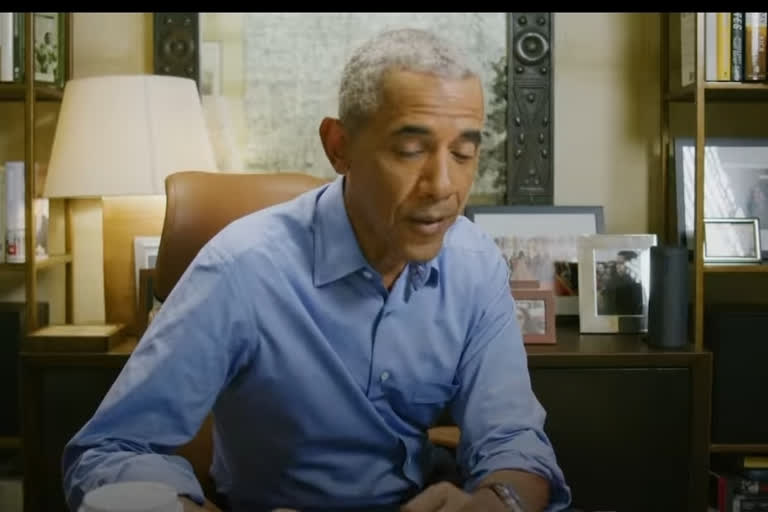New York: Former US President Barack Obama unleashes the West's worst stereotypical picture of India as a country with "all-too-pervasive" violence and politics revolving around "religion, clan, and caste" in his latest memoir and yet in the same breath talks about Sonia Gandhi, a "mother of European descent", emerging as the most powerful politician who can appoint Manmohan Singh from a minority as prime minister.
"Across the country, millions continued to live in squalor, trapped in sunbaked villages or labyrinthine slums, even as the titans of Indian industry enjoyed lifestyles that the rajas and moguls of old would have envied," he writes in his new memoir, "A Promised Land".
He writes, "Violence, both public and private, remained an all-too-pervasive part of Indian life."
Obama, the son of a Kenyan father and a White American mother, pretends to labour under the time-worn cliche of bearing the "Whiteman's burden", in a broad sweep encapsulates the nation in its entirety with these images.
Read:|It is time for Trump to concede, says Obama
The image of India he offers up with supercilious condescension to his readers is not something he had seen for himself, as he acknowledges not having travelled to the country before becoming president, although "the country had always held a special place in my imagination".
"Expressing hostility toward Pakistan was still the quickest route to national unity" in India, he writes.
As if India shouldn't develop nuclear weapons as a deterrent to Pakistan's N-bomb, he writes, many Indians take "great pride in the knowledge that their country had developed a nuclear weapons program to match Pakistan's, untroubled by the fact that a single miscalculation by either side could risk regional annihilation".
He cannot ward off the temptation to lay on stereotypes, although he starts off acknowledging that "in many respects, modern-day India counted as a success story, having survived repeated changeovers in government, bitter feuds within political parties, various armed separatist movements, and all manner of corruption scandals".
"The transition to a more market-based economy in the 1990s had unleashed the extraordinary entrepreneurial talents of the Indian people -- leading to soaring growth rates, a thriving high-tech sector, and a steadily expanding middle class... and Prime Minister Manmohan Singh's economic reforms lifted millions out of poverty", he writes.
But reverts to stereotype: "Despite its genuine economic progress, though, India remained a chaotic and impoverished place: largely divided by religion and caste, captive to the whims of corrupt local officials and power brokers, hamstrung by a parochial bureaucracy that was resistant to change."
Obama and his wife reportedly received $65 million as advance from their publisher for their memoirs.
"A Promised Land" ends with 2011 and the next volume is to pick up after that. For that reason, Prime Minister Narendra Modi does not figure in the book.
Read:|Trump jealous of COVID's media coverage: Obama
The ascent to prime ministership by Singh, a member of "often persecuted Sikh religious minority," he writes, "sometimes heralded as a hallmark of the country's progress in overcoming sectarian divides, was somewhat deceiving".
"More than one political observer believed that she'd chosen Singh precisely because as an elderly Sikh with no national political base, he posed no threat to her 40-year-old son, Rahul, whom she was grooming to take over the Congress Party," Obama writes.
